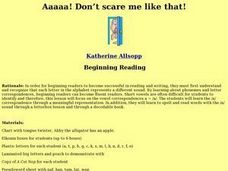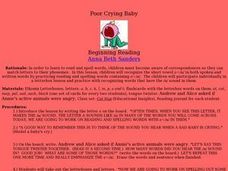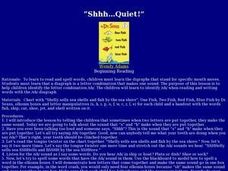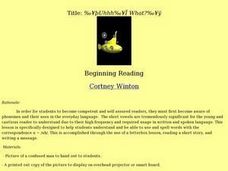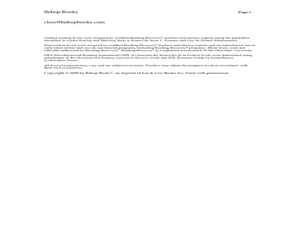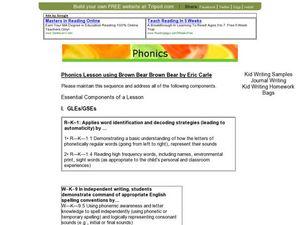Curated OER
"Aaaaaa!!!!" Please Don't Cry Baby!
Learners complete a variety of activities as they examine the letter 'a' as it makes the short /a/ sound. Through instruction and modeling, they explore the sound the letter makes and how the letter is written. They recite tongue...
Curated OER
Aaaa! Don't Scare Me Like That!
Students practice saying each letter of the alphabet to determine the different sounds from each letter. As a class, they are given a tongue twister to practice making the "a" sound and spelling the words. To end the lesson, they...
Curated OER
Cat Nap
Students identify and interpret the concept of the vowel /a/ and recognize it in words and illustrations. They also practice writing both upper and lower case A on writing paper. Finally, students name pictures and circle the pictures...
Curated OER
Class Alphabet Book
Young scholars are introduced to the Kid Pix software program and its templates. With a partner, they use the internet find a picture that starts with each letter of the alphabet. They practice saying and reading the words to their...
Curated OER
Bob and the Frogs Hop on Logs
Students complete a variety of activities as they explore/review the letter 'o' as it makes the /o/ sound. They recite tongue twisters and practice writing words with the /o/ sound. They read a story and choose /o/ words from the story...
Curated OER
Casper the Cat
Students examine the letter 'a'. Through instruction and modeling and a variety of practice activities, they explore the sound the letter makes and how the letter is written. They recite tongue twisters, read stories and use letterboxes...
Curated OER
Aaaaa! A Monster!
Young scholars complete a variety of activities as they examine the letter 'a' as it makes the short /a/ sound. Through instruction and modeling, they explore the sound the letter makes and how the letter is written. They recite tongue...
Curated OER
Uhh I don't know!
Learners engage in an emergent literacy lesson in order to work on the skill of phonem ic awareness. The use of flashcards is essential for the instruction of the lesson. Students match the card with its beginning phoneme.
Curated OER
Poor Crying Baby
Students examine the letter 'a'. Through instruction and modeling and a variety of practice activities, they explore the sound the letter makes and how the letter is written. They recite tongue twisters and read stories and pick out...
Curated OER
Sammy the Slimy Snake
Students engage in a emergent literacy lesson with the intention of improving reading comprehension. The goals of the lesson include recognizing both upper and lower case S, to create an awareness of the mouth movement and the phoneme...
Curated OER
Shhh! Quiet!
Students become aware that when certain letters are put together in a word they are said with a single mouth move. Through modeling and a variety of guided practice activities they explore the /sh/ phoneme. They read and identify 'sh'...
Curated OER
Uhhh..What?
Students identify and become competent and in reading the letter u, pronounced /uh/. They also use and spell words with the correspondance u = /uh/ by the use of a letterbox lesson, reading a short story, and writing a message.
Curated OER
What Do You See at the Pond?
With What Do You See at the Pond?, young readers explore pond life and practice reading strategies. Learners first make predictions and then read the simple story independently. After a second read-through with a partner, kids come...
BBC
The Cream Cake Mystery - Seeing Patterns
A great language arts lesson designed for emerging readers awaits your class. Rhyming words are the focus. Learners play an interactive learning game on the computer that helps them to understand words that rhyme. As with all of these...
BBC
The Sound Monster - Words That Make Sounds
There are words in the English language that actually make sounds, such as vroom, and, buzz. Here is a clever lesson which introduces young readers to these sound-making words. They play an interactive game on the computer that has...
Curated OER
Chopping Sounds
With the swing of a paper ax, young learners demonstrate how to appropriately segment three-letter words. Consider breaking learners into small groups and having them share a paper ax to keep the peace. This plan is so creative, but be...
Curated OER
Kindergarten Exploration Tubs
Students identify their names as a symbol for themselves. They describe characteristics of organisms. They utilize tools to gather data and compare size.
Curated OER
Brown Bear Phonics
Students listen to Brown Bear, Brown Bear and imitate the style of Eric Carle in writing a sentence. In this writing lesson, students use the beginning and ending sounds of words to write an Eric Carle type sentence. ...
Curated OER
Story-Hour Kit
Students explore four picture books. In this early childhood lesson plan, students are read the books, discuss them, and then complete extension activities. These include writing and illustrating their own experiences, practice with...
Curated OER
Rhyme In Time
Students engage in a lesson plan that is concerned with the concept of rhyming and recognize them in different pieces of literature that includes songs, speech, and poetry. They also listen to music to make an auditory connection to the...
Curated OER
Name Games
Students develop a sense of self. They complete several activities involving their name. They disuss what names are useful for safety purposes.
Curated OER
Pronunciation of Final Consonants
Students in ESOL classes discover how to recognize and pronounce final consonant sounds. With partners, they read passages aloud and practice the correct pronunciation. Students emphasize pronouncing the final consonant and attempt to...
Curated OER
Thanksgiving History
First graders gain knowledge about the first Thanksgiving, how the pilgrims lived and the differences between our Thanksgiving today and the Thanksgivings of the past. They recognize different parts of the word Thanksgiving.
Curated OER
Shared And Guided Reading with On Our Farm
Students participate in pre-reading activities before reading the book, On Our Farm. They read the book independently, but are guided by directive questions from their teacher. A discussion follows, as well as repeated readings for mastery.



